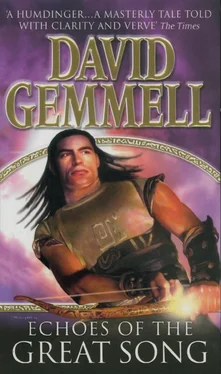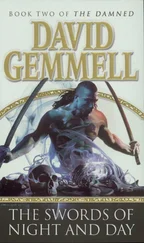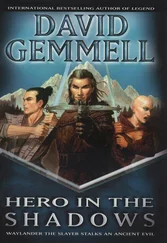'No, it will not. I will go below to the store rooms and begin to assemble the equipment. You return to the ice with the fresh team, and re-site the receivers. Place them closer together, each no more than ten units apart. Hold to the emanations as best you can. This time do not seek Communion, merely try to read the ebb and flow. How much movement is there, and between which points. You follow?'
'Yes, lord.'
Then do not delay,' said Questor Ro, waving his hand towards the door. The exhausted Vagar bowed, then left the room. Questor Ro had all but forgotten him even before the door closed.
Karesh Var had been asked many times what made him a great hunter. Young men were fascinated by his success in killing tuskers. He answered none of their questions. Did they not have eyes to see his skills? Could they not look at the scars he bore — the wicked cut upon his cheekbone, the ragged tear that had lost him half an ear — and realize that, though his youthful recklessness had placed him in many perils, he had survived to learn from his mistakes? The answer was, apparently, no. They watched him, tried. to emulate him, and failed. And men, being what they are, called him lucky. They claimed he was blessed by the gods, and that he carried a secret talisman which drew the tuskers to him. Karesh found it all faintly amusing.
Idly he rubbed at the long vivid scars on his right cheek. A kral's talons had almost ripped his face away, but he had killed the man-beast with a dagger thrust to its heart. That incident alone had taught him to be wary and ever-patient in the hunt. Death lay waiting everywhere in this icy land. As to his skill with the tuskers, that was born from love, and the endless magic that sprang from love. Though he would never explain that to his followers. Let them learn themselves, he thought. Why would a man give away the secrets that led him to such glory among his people?
Anyway, they would have laughed at the notion.
Karesh Var loved the tuskers, and saw in them all that was good upon the cold earth. They were loyal creatures, fiercely protective of one another. They raised their young with endless patience, and they moved across the land with immense dignity, coupled with a lordly arrogance.
Leaving his twenty men seated around two campfires Karesh Var saddled his pony and rode out along the ridge. From here he could look down on the plain and observe the death ritual. His men were not interested in such spectacles. They had seen them before, the herd forming a protective circle around the dying mammoth, the great bulls pushing their tusks beneath the victim, trying to raise her to her feet. His men found it boring to sit out in the cold until the cow died. Not so Karesh Var.
Two days ago they had hit the herd, three riders moving in fast to taunt the righting bulls, pulling them away from the rear. Then ten men on fast ponies had galloped in on the flanks, shooting their arrows into the victim chosen by Karesh Var. When they wheeled away Karesh Var and four others rode in, plunging their spears into the wounded animal.
Then they withdrew to wait. The herd moved on, two bulls flanking the stricken victim, seeking to protect her from further harm. But she was dying now, and all that was required of the hunters was patience.
As Karesh Var sat upon his pony and watched, the cow pitched to her side, her long trunk rising and falling, seeking perhaps to taste the air for one last time. Around her the bulls had ceased in their efforts to raise her body. They fell back, and the whole herd lifted their trunks and trumpeted to the skies. Perhaps it was a farewell song. Karesh Var did not know, but it touched him. Alongside her now two of the bulls gouged the earth with their tusks. Then the herd moved around the body in a slow circle before heading away towards the east.
Karesh Var watched them go, then rode his pony down the slope, dismounting alongside the massive corpse.
Moving to the great head he placed his palm on her brow. 'You died so that my people may live,' he said. 'I thank you for the gift of life, and I pray that your soul walks in the garden of all things.'
His riders arrived within the hour. Two of them set about sawing away the tusks, which would later be trans-formed into buttons, bracelets, buckles and ornaments, many to be sold to the people of the eastern cities. The meat would be cut and salt-dried, the bones reduced to powder for medicinal remedies and animal feed. The skin would be dried and used in the making of boots, jerkins and other clothing. This one mammoth represented great wealth to the Zheng tribe.
The legendary Karesh Var had succeeded once more, and his people would survive the long winter in relative comfort.
One of his men brought him a bloody strip of meat. Karesh Var threw it over his shoulder and mounted his pony, carrying the meat downwind, hurling it out on to the snow. Sabre-tooths, wolves and krals would have picked up the scent of blood long before now, and were probably already tracking the kill. The meat would give them something to fight over until the wagons arrived.
By mid-afternoon the wagons were loaded and the long trek back to camp began. No krals had appeared, which pleased Karesh Var greatly, and he had left enough meat behind to satisfy the sabre-tooths. All in all this had been a good day.
The riders and wagons slowly climbed the mountain road. The sun was bright, though not warm, and Karesh Var tied down the ear-flaps of his fur hat. These last two years, since he had turned thirty-five, he had felt the cold more, though he told no-one — except his wife. She had made him the hat from rabbit fur. Karesh Var smiled. Most of the tribesmen felt he was foolish to have only one wife. But she was worth any ten women he had known. He was looking forward to seeing her again, when one of his scouts came riding down the trail.
'The black boat has returned, Karesh,' he said. 'There are Blue-hairs upon the ice.'
It was nearing noon when the first of the six silver pyramids began to glow. Questor Ro, cold and exhausted now after hours upon the ice, saw it begin. At first he rubbed his tired eyes, thinking the glow merely a dream-like symptom of weariness coupled with desire. He stared hard at the four-foot-high triangular structure, its interlinked silver poles wrapped in gold wire. Was it just reflected brightness he was seeing? Then he sensed the excitement in the Vagars around him. They too could see it, a halo of white light radiating from the structure. All weariness vanished from Questor Ro.
Beside him a slim Vagar was holding the small wooden box from which golden wires trailed to the snow, spreading out to link with each of the six pyramids. 'Stand very still,' Questor Ro told him. Moving alongside the man he carefully lifted the lid, holding it at an angle which prevented the Vagar from seeing inside. Two of the white crystals set into the mica were glowing brightly. The third was flickering with a soft gentle light. Questor Ro set the lid back in its place. A second pyramid began to glow, then a third.
The twelve Vagars stood in stunned silence as, one by one, each of the six pyramids began to radiate white light.
'Do not move,' Questor Ro reminded the box-holder.
'Yes, lord.'
As if obeying his own instruction Ro also stood still, excitement causing him to tremble. With an effort he swung away and summoned four of the Vagars to follow him to the waterside, where several boxes and a linen-covered chest were lying on the snow. From one box the Vagars took wooden overshoes which they slipped over their fur-lined boots. Then they took from their deep pockets long wooden thimbles, which they placed over their fingers and thumbs.
Carefully they unwrapped the white linen from around a rectangular chest, some four feet long and three feet wide. It was of black wood, heavily engraved with symbols the Vagars could not read. On each of the two longest sides three large golden rings were set into the wood.
Читать дальше












